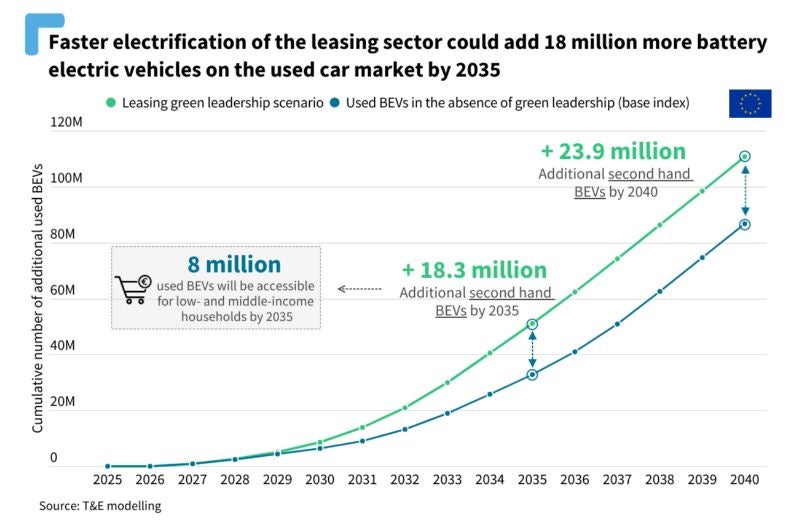Under current electrification rates, approximately 33 million households in the EU will have access to second-hand electric cars between now and 2035, according to a recent report by Transport & Environment (T&E).
However, if the leasing sector accelerates its adoption of electric vehicles (EVs), this figure could surge by 56% to reach 51 million households. The study emphasizes the potential economic benefits for these additional 18 million households, highlighting savings on car expenses.
The leasing sector plays a pivotal role in the used car market, with four in ten cars entering the second-hand market annually in the EU originating from leasing companies.

T&E, a Brussels-based NGO campaigning for cleaner transport, advocates for a faster electrification pace within the leasing sector, calling on Europe’s top seven leasing companies to commit to phasing out fossil fuel cars and exclusively leasing battery electric vehicles (BEVs) by 2028. The broader sector is encouraged to align with this commitment by 2030.
Presently, nearly eight out of ten EU citizens purchase second-hand cars, with around 90% of low and middle-income groups opting for the used car market. Even among higher-income groups, this percentage remains substantial at 62%.
A study by BEUC, a European consumer group, reveals that second-hand battery electric vehicles offer significantly lower ownership costs compared to used petrol cars.
How well do you really know your competitors?
Access the most comprehensive Company Profiles on the market, powered by GlobalData. Save hours of research. Gain competitive edge.

Thank you!
Your download email will arrive shortly
Not ready to buy yet? Download a free sample
We are confident about the unique quality of our Company Profiles. However, we want you to make the most beneficial decision for your business, so we offer a free sample that you can download by submitting the below form
By GlobalDataGoing electric can lead to savings of almost €6,000 over seven years. T&E underscores the importance of a consistent influx of electric cars into the second-hand market to facilitate cost savings for European families.
Stef Cornelis of T&E emphasises the potential for a mass influx of affordable electric cars into the second-hand market. Leasing companies, he notes, hold the key to this transformation. Accelerating the transition to electric vehicles within leasing companies could democratise access to electric cars, making them more accessible to a broader demographic.
The study envisions a scenario where, if the leasing sector takes a leading role in the adoption of battery electric cars, an additional 18 million second-hand BEVs could enter the market by 2035. Crucially, eight million of these vehicles could be priced at €10,000 or less, aligning with the average price paid by low- and middle-income households for a used car.
Despite claims of green leadership, T&E’s research indicates that leasing companies are not moving swiftly enough in transitioning to electric cars. None of Europe’s largest leasing companies has set a date to phase out fossil fuel cars, and the uptake of battery electric vehicles aligns only marginally with the overall market.
T&E’s undercover investigation in France and Germany further reveals that leasing companies’ sales staff are not consistently facilitating the transition to electric vehicles for customers.
The report underscores the potential for a significant shift toward electric mobility if the leasing sector takes proactive steps, emphasising the economic and environmental advantages. The call to action is clear: for leasing companies to play a pivotal role in accelerating the electrification of the automotive market and making electric vehicles a viable and affordable option for the majority of European households.









